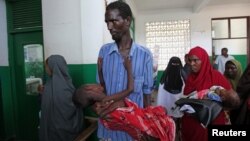LONDON -- The World Health Organization said Friday that cholera is on the rise in Kismayo, an al-Shabab-held town in southern Somalia.
At one Kismayo health facility, WHO officials say a rapid test found that six-in-10 patients had cholera, 65 of whom have since been treated.
"It's a worrying sign so far, we will have to see what happens now in the next couple of days," says WHO spokesperson Pieter Desloovere. "But it may be an alert that something more is happening on the ground."
The WHO says Kismayo General Hospital has reported around 650 suspected cholera cases since the beginning of this year, with 40 cases reported weekly since May.
Islamist al-Shabab militants, who once controlled much of the country in their fight to overthrow Somalia's transitional government, have lost much of their territory to a multi-nation offensive over the past 18 months, but they still control Kismayo.
"That particular area is where the opposing forces are sitting," says Desloovere. "They don't really allow chlorination of water, so what water people do use may be contaminated, and people do get sick."
An Under-Reported Global Threat
The WHO estimates that at least 100,000 people die of cholera worldwide each year, and one official says numbers have been rising steadily since the beginning of the millennium.
"Cholera remains a global threat to public health and is a key indicator of lack of social development," says Tarik Jasarevic, a WHO spokesperson who calls the disease especially persistent in sub-Saharan Africa and Asia. "The re-emergence of cholera has been noted in parallel with the increasing size of vulnerable populations living in unsanitary conditions."
While official statistics on cholera are difficult to gauge -- many cases go uncounted due to inadequate tracking of weak or under-resourced health systems -- Jasarevic says some people fear the potential economic consequences of reporting outbreaks.
"There is a fear of trade and travel sanctions if cholera is being reported," he says. "So we say the true burden of cholera is estimated at between three- and five-million cases every year."
Cholera is an acute diarrheal disease that can kill within hours if untreated. Most cases, if treated in time, can be remedied with oral rehydration salts.
On Friday, the WHO reported that the majority of recent cases in Kismayo have been children under the age of eight.
At one Kismayo health facility, WHO officials say a rapid test found that six-in-10 patients had cholera, 65 of whom have since been treated.
"It's a worrying sign so far, we will have to see what happens now in the next couple of days," says WHO spokesperson Pieter Desloovere. "But it may be an alert that something more is happening on the ground."
The WHO says Kismayo General Hospital has reported around 650 suspected cholera cases since the beginning of this year, with 40 cases reported weekly since May.
Islamist al-Shabab militants, who once controlled much of the country in their fight to overthrow Somalia's transitional government, have lost much of their territory to a multi-nation offensive over the past 18 months, but they still control Kismayo.
"That particular area is where the opposing forces are sitting," says Desloovere. "They don't really allow chlorination of water, so what water people do use may be contaminated, and people do get sick."
An Under-Reported Global Threat
The WHO estimates that at least 100,000 people die of cholera worldwide each year, and one official says numbers have been rising steadily since the beginning of the millennium.
"Cholera remains a global threat to public health and is a key indicator of lack of social development," says Tarik Jasarevic, a WHO spokesperson who calls the disease especially persistent in sub-Saharan Africa and Asia. "The re-emergence of cholera has been noted in parallel with the increasing size of vulnerable populations living in unsanitary conditions."
While official statistics on cholera are difficult to gauge -- many cases go uncounted due to inadequate tracking of weak or under-resourced health systems -- Jasarevic says some people fear the potential economic consequences of reporting outbreaks.
"There is a fear of trade and travel sanctions if cholera is being reported," he says. "So we say the true burden of cholera is estimated at between three- and five-million cases every year."
Cholera is an acute diarrheal disease that can kill within hours if untreated. Most cases, if treated in time, can be remedied with oral rehydration salts.
On Friday, the WHO reported that the majority of recent cases in Kismayo have been children under the age of eight.




